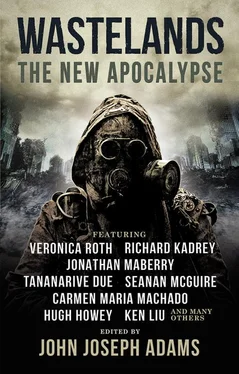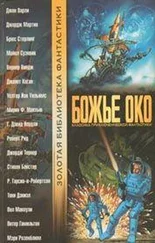There’s a difference between dissection and butchering. Dissection reveals, but butchering renders. I’m a dissector, professionally, pressed into service as a butcher. I mean, I was a biologist. Am a biologist.
The body in front of me is a man. I know him, although not very well—there aren’t that many of us so I know pretty much everybody. His name is Art. He looks much smaller, positively shrunken, laid out in the kitchen, and very, very white. I haven’t seen many naked male bodies but I am intimately acquainted with Art’s. I have washed him. I’m not attracted to men when they’re alive, much less when they’re dead, but I feel a weird protectiveness toward Art. I’ve felt the softs pot in his skull from the fall that killed him. I have washed around his balls and the curled mushroom of his penis. I have cradled his hard and bony feet.
Now I tie a rope around his ankles and hoist him. This is a commercial kitchen with big steel counters and a Hobart dishwasher. The pulley in the ceiling is new. It sounds easy—“I tie a rope around his ankles and hoist him”—but I am not very strong these days and just one pulley means I’m hauling his whole weight. I don’t know what Art weighs. He used to weigh more; we all used to weigh more. I am so tired, my fingers are cold. I’m seeing spots when I pull hard on the rope.
Kate has taken to calling the town Leningrad, which is lost on most of the people here. It’s because we’re under siege in this stupid little Alaska excuse. It’s got an airstrip, a Coast Guard base, an Army listening post, a dozen houses, and it’s surrounded on two sides by water—the ocean at our back and a river called Pilot’s Creek on one side. The Army listening post was monitoring the Russians, of course, which is probably where Kate got the idea of Leningrad.
So anyway, I get Art hanging, fingers just sweeping the floor. The dead are limp. Heavy. One of the locals used to hunt when there was anything to hunt. Eric Swetzof is a long-bodied, short-legged native Unagan. Maybe, he says, he and his wife are the last Unagan left alive. He told me the steps to field dressing a large animal.
Eric is not going to eat Art. There is a group of people who have declared themselves to be non-eaters. Eric says he understands the people who have voted to eat and he doesn’t judge them, he just can’t. Can’t cross that line.
I understand him, too. I stand in front of a human with a good knife. “Blade at least four inches long,” Eric said. “You want a real handle on the thing, and a guard. When the knife hits bone it can turn and you can end up cutting yourself.”
I used to like to cook. I’ve cut chickens into parts. I’m familiar with the way a joint shines white with ligament and tendon. What hangs in front of me is an animal. I am an animal. I don’t believe there is something particularly special about bodies and I don’t believe in souls, the afterlife, or the resurrection of the dead. I tell myself that this is a technical challenge. It’s a skill I have some parts of and I will learn the rest as I go.
I am not sentimental.
I put a plastic tub underneath Art to catch blood and viscera.
It’s still very hard to open his throat. His insides are still lukewarm. I’m so hungry.
* * *
Butchering has gotten me out of manning the defenses today. We all have to man the defenses but I’m nearsighted and terrible with a gun. Luckily, there isn’t much shooting because neither side has much in the way of ammunition. They are mostly men, as best we can tell, a lot of them fairly young. Maybe thirty of them, some still in ragged military fatigues. They are in the sharp green hills, waiting us out. They have a couple of boats, Zodiacs, but we sunk one when they first attacked and now they either don’t want to risk them or they are holding them until we’re too weak to fight back.
Or maybe they’re getting too weak to fight.
I find Kate on Beach Road. It runs along the beach, of course, and then turns inland and runs to the airstrip. It’s cloudy and soft, it rains all summer here. The air off the water smells wrong. It should smell of fish and salt, that slightly rank and pleasant stink of ocean, but instead there’s a taste to it, like nail polish or something. Organics. Esters and aldehydes.
Kate is sitting cross-legged with a paperback on one knee and a rifle next to her. Technically she’s on sentry, watching the ocean, but we’re sloppy civilians. Does the distinction even matter anymore? She’s taller than me—a lot of people are taller than me. I’m 5’ 4”. She’s rangy; a long-legged, raw-boned woman with large hands and feet. She’s originally from New Mexico but she’s an Anglo with light hair and blue eyes.
I am still surprised when I see her in glasses. She has worn contacts as long as I have known her. She was always going to get corrective eye surgery. Too late now.
I can’t tell if she is pleased to see me. I mean, usually she would be, but she knows what I’ve been doing. Kate is a non-eater.
I sit down next to her and watch the chop.
“All done?” she asks.
I nod.
I think for a moment she is going to ask me if I’m OK, which is something we would have done for each other before. She doesn’t and I don’t know what I would answer if she did. I’m both not OK and weirdly OK.
“What’s the book?” I ask.
She flips it over so I can see the cover. The Da Vinci Code . I can’t help it, I bark out a laugh. Kate hated the book when it came out.
She sighs. “There aren’t that many books here at the end of the world.”
“It’s not the end of the world,” I snap.
She rolls her eyes. “Don’t tell me about the Great Oxygenation Event or Snowball Earth again or I’ll scream.”
It isn’t the end of the world—just maybe the end of us. Or maybe not, humans are clever beasts and the world is a big place. It’s probably not even the biggest extinction event the Earth has ever seen. The Permian extinction killed something like 95 percent of life—including bacteria. Life comes back. It may take millions of years. First bacteria, then multicellular organisms, then plants and animals. We’re just another set of dinosaurs, about to go extinct. Although some dinosaurs actually survived the Cretaceous-Tertiary extinction. We just call them birds.
“You’re sitting there composing a speech,” Kate says.
“I’m not going to say anything,” I say.
“You intellectualize as a defense mechanism.”
“I don’t think psych talks about defense mechanisms anymore,” I say. Back when we were both at the university we were also both in therapy. Growing up gay pretty much ensured you were messed up about something. My therapist told me I was an emotophobe—afraid of negative emotions.
“What’s your defense mechanism?” I ask.
She laughs. “These days? Anger. When I have the energy.”
I brought her here. Not specifically here, this ass-end little Alaskan town, but “here” as in leaping at a chance to go to Juneau to study giant viruses and get us away from the increasing chaos of the lower forty-eight.
I look at her wrists, narrow, the knob of the Olecranon Process standing under scaly skin. Her ankles are swollen.
Kate and I bitched about Houston the entire time we lived there. When I took the position, I had no idea that Houston was tropical. Ninety-eight degrees in the summer with 99 percent humidity. Flying cockroaches the size of my thumb. Getting into the car at the end of the work day was like climbing into a pizza oven.
Honestly, though, I remember Houston this way:
In the last year we were there, crime was getting horrible. There were refugee camps outside Brownsville and Laredo. Rolling brownouts. We had a used Prius, which was good because gas was rationed. Hamburger was twenty-two dollars a pound.
Читать дальше


![Nick Cracknell - The Quiet Apocalypse [= Island Zero]](/books/28041/nick-cracknell-the-quiet-apocalypse-island-zero-thumb.webp)









